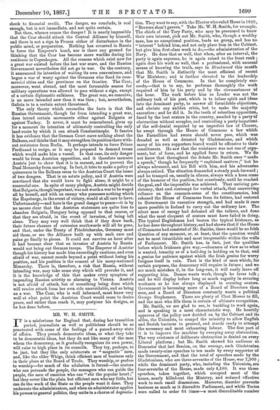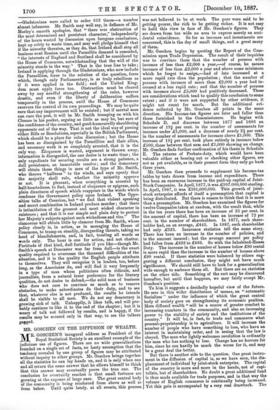MR. W. H. SMITH.
IT is a misfortune for England that, during her transition period, journalists as well as politicians should be so penetrated with some of the feelings of a passed-away state of affairs. They preach democratic ideas, or what they take to be democratic ideas, but they do not like many of the men whom the democracy, as it gradually recognises its own power; will raise to high place in its councils. They try, perhaps, to be just, but they like only aristocrats or "magnetic" men, and, like the older Whigs, think efficient men of business only in their place at the Board of Trade. They worship, or profess to worship—for much of the adulation is forced—the orators who can persuade the people, the managers who can guide the people, the men of emotion who can "stir the popular heart ;" but they never like the plain but efficient men who say little, bat can do the work of the State as the people want it done. They underrate the administrators, and when an adminietratorapplies his powers to general politics, they unite in a chorus of deprecia- tion. They want to say, with the Elector who ruled Hesse in 1848',, "Brewers shan't govern.' Take Mr. W. H. Smith, for example. The chiefs of the Tory Party, who may be presumed to know their own interest, pick out Mr. Smith, who, though a wealthy man, has no exceptional position, leads no group, and has no "interest" behind him, and not only place him in the Cabinet, but give him first-class work to do,—the administration of the Navy. He does that so well, that when, after an interval, the party is again supreme, he is again raised to the front rank ; again does his work so well, that a professional, with unusual means of knowing the truth, says in Blackwood this month that Mr. Smith is distinctly the most efficient of recent War Ministers ; and is further elevated to the leaderahip of the House of Commons. In that he completely ono- ceeds,—that is to say, he performs thoroughly the work required of him by his party and by the circumstances of the hour. The work before him as Leader was not the ordinary task of his post, which is to infuse spirit and ideas into the dominant party, to answer all formidable objections, and obviate any sudden crisis, but to make the majority executive ; and he did it. In the teeth of relentless opposition, faced by the best orators in the country, assailed by a partyof obstruction without scruples, and controlling a party impatient of the self-denial required by an imperfect law of Closure, he swept through the House of Commons a law whielt the Parnellites had sworn should never pass, which -was dreaded as well as detested by Gladstonians, and whish many of his own supporters feared would be offensive to their constituents. He saw that the resistance was not one of argu- ment, but of force, and he applied force in return. We'do not know that throughout the debate Mr. Smith once "made a speech," though he frequently "explained matters ;" but he always advanced, and his Bill with him, and his adversaries always retired. The situation demanded a steady push forward ; and he tramped on, usually in silence, always with a keen sense of the humour of the position, but ceaselessly, until he reached the goal, and the impossible was achieved. That untiring per- sistency, that cool contempt for verbal attack, that unswervieg reliance on the common-sense of the constituencies, had released the House of Commons from its fetters, had restored to Government its executive strength, and had made it once more possible in Ireland to carry out the ordinary law. The silent man of energy had defeated all the talkers, and done what the most eloquent of orators must have failed in doing. The typical Englishman had beaten the typical Irishman, as he has done throughout history, and had shown that if the House of Commons had consisted of Mr. Smiths, there would be no Irish Question of any moment, or, at least, that the question woul& not be most formidable and most irrepressible within the walls of Parliament. Mr. Smith has, in fact, just the qualities before which Irishmen give way,—clearness of view as to what is wanted, tenacity as of a bull-dog in holding on to that, and a genius for patience against which the Irish genius for worry fatigues itself in vain. That is the kind of man which, for certain purposes, the democracy will require in future ; and we are much mistaken if, in the long-ran, it will easily leave off supporting him. Demos wants work, though he loves talk ; and he will display before long as much sagacity in securing workmen as he has always displayed in securing orators. Government is becoming more of a Board of Directors than ever, and a Board of Directors constantly wants a political George Stephenson. There are plenty of Chat Mosses to fill, and the man who fills them is certain of ultimate recognition.
Mr. Smith, we are glad to see, is buckling to work again,, and is speaking in a most characteristic way. He heartily approves of the policy now decided on by the Cabinet and its allies, the Unionists, to compel the minority to allow English and Scotch business to proceed, and stands ready to attempt the necessary and most exhausting labour. The first part of it is to improve the machine by sweeping away obstruction. The very existence of deliberate obstruction is denied on every- Liberal platform ; but Mr. Smith showed his audience at Doncaster that last Session, on the average, each Gladatonian made twenty-nine speeches to ten made by every supporter -Of the Government, and that the total of speeches made by the Gladstonians, who are three-sevenths of the House, was 7,300; while the dominant party, who, including the Unionists, are four-sevenths of the House, made only 4,100. It was those speeches, taken together, which occupied most of the hours, nearly killed-out the Ministry, and reduced effective work to such small dimensions. Moreover, disorder prevents business as much as it discredits Parliament, and while Tories were called to order 64 times—a inset discreditable number
—Gladstonians were called to order 612 times—a number almost infamous. Mr. Smith may well say, in defiance of Mr.
Morley's smooth apologies, that "there was obstruction of the most determined and persistent character," independently of the hours wasted by discussion upon foregone conclusions, kept up solely to waste time, and may well pledge himself that if the minority threaten, as they do, that Ireland shall stop all business next Session until the Parnellite demand is conceded, "the interests of England and Scotland shall be considered by the House of Commons, notwithstanding that the will of the minority stands in the way." That is the true line to take ; Ireland is applying through the Gladstonians, who now include the Parnellites, force to the solution of the question, force which, though only Parliamentary, is is truly rebellious as if it were applied in the field ; and the United King- dom must apply force too. Obstruction must be cleared away by any needful strengthening of the rules, however drastic, and even if the liberty of deliberation suffers temporarily in the process, until the House of Commons recovers the control of its own proceedings. We may be quite sure that any improvement will be resisted ; but if mortal man can cure the pest, it will be Mr. Smith tramping on with his Closure in his pocket, arguing as little as may be, but sure of the confidence of the country, and good-humouredly shouldering opponents out of the way. That is not the ideal way of passing either Bills or Resolutions, especially in the British Parliament, which should be a place for calm discussion ; but the House has been so disorganised by the Parnellites and their allies, and necessary work is so completely arrested, that it is the only way. Eloquence is wasted, argument is thrown away, information is disregarded, the one desire is to waste time ; the only expedients for securing results are a strong patience, a dull persistence, an immutable resolve ; and the democracy will obtain those things in men of the type of Mr. Smith, who throws " halfness " to the winds, and says openly that the majority shall rule, whether the minority approve or not. It is pleasant, when everything is arrested by half-heartedness, to find, instead of eloquence or epigram, such plain directness of speech which reappears in the words which condense the Government policy upon Ireland. The Oppo- sition talks of Coercion, but "we find that violent speaking and secret combination in Ireland produce murder ; that there is intimidation of the grossest and most wicked character in existence ; and that it is our simple and plain duty to protect her Majesty's subjects against such wickedness and vice." The clamorous will obtain little by clamour from Mr. Smith, whose policy clearly is, in action, as in managing the House of Commons, to tramp on steadily, disregarding threats, taking no heed of blandishments, and, in fact, treating all words as words only. The hour is one for action, and not chatter. Fortitude of that kind, dull fortitude if you like—though Mr. Smith's speech at Doncaster was far from dull—is the exact quality required to overcome the thousand difficulties of the situation, and it is the quality the English people attribute to themselves. They will recognise it in leaders, too, before long, as the Americans do, and will find it very frequently in a type of man whom politicians often ridicule, and journalists, from a natural inner preference for the literary qualities, do not desire to defend,—the solid man of business who does not care to convince so much as to remove obstacles, to make subordinates do their duty, and to see that, whatever else is not produced, the results he intends shall be visible to all men. We do not say democracy is growing sick of talk. Unhappily, it likes talk, and will pro- bably continue to like it to the end of the chapter ; but it is weary of talk not followed by results, and is happy, if the results may be secured only in that way, to see the talkers gagged.























































 Previous page
Previous page